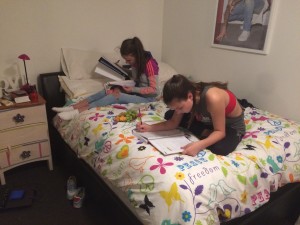It can often be a struggle to encourage your child to complete a set amount of time of homework and revision hours weekly, as it often feels like a fight over control. You feel as a parent you should be guiding them to sit down and study whereas they feel they are now needing independence and should be able to choose when they do themselves – which many of us must have noticed does not always go as according to plan with younger children.
You may have noticed some of the ways that your children try to hold onto their control by sometimes doing their homework but not handing it in, doing it in sloppy handwriting or by just not studying carefully for their tests. In return when this happens parents feel more frustrated and push, punish, argue with their children even more to try and persuade them to complete their homework.
One of the first things you need to do is take a step back and try to guide your child instead of trying to control him/her. Children are motivated, they do want to impress you however when you show signs of anger and frustration you ultimately end up scaring them and pushing them away.
You need to ask yourself what has worked in the past, think about a time where your child has completed their homework well without any fussing or hassles. Was there something different about that situation, what could it have been that made it work? Perhaps you were sitting with your child in the same room and were available to answer their questions instead of being tuned out on your smartphone. Or maybe the TV was off and younger siblings in a different room which meant they had minimal distractions. The best way to figure this out is by speaking to your child directly – ask him/her what motivates them to work and trust their answer, go with it for a few days and see if that truly does affect his study outcome in a positive manner.
Another way to encourage your child to complete their own work is by stopping arguing with them over it every day. If they are a little older and mature then try taking a step back; let the homework stay between the teacher and the student. Once the student starts to face the repercussions of their negligence in revising and completing set work then they will have no choice but to complete their work or face further punishments from the school. Your sole job as a parent is to help your child do his job, make a better safer environment at home with less arguments and they will naturally lean towards completing their work.
If you and your child prefer when you sit with him/her to help them study and it makes you tense, then you both can take a short break. You don’t need to do thirty minutes of straight uninterrupted study session; no one is watching or grading your child for this. What matters is the quality of the work they complete and how well they learn the topic at hand.
One of the most effective ways to improve your child’s learning and routine is by setting necessary structures in place. It has been scientifically proven that when you do the same type of task at the same time and place regularly you will learn and memorise more than if your surroundings and task were to keep changing. Make a public area of your home such as the living or dining room a study area for your child so that you can also keep an eye on them and they can easily reach you if they need assistance, and keep the bedroom as a place of rest at the end of a busy day so they don’t feel stressed at night. Another effective technique many parents have found is that when grades are falling, minus the screen time such as TV, Game Consoles and smartphones so that your child can concentrate more on his work and understands they can then do the leisure activity of their choice as a reward once their work or target has been met. You should also make your child understand that weekend activities and meeting up with friends will only occur once homework and other priority tasks have been completed. These methods will definitely assist your child in making better decisions and improving their time management skills.
As a parent we need to understand that we are the first role models to our children’s eyes. Don’t over focus on what you think is best for your child, take a step back and think about what your own personal life goals are and what ‘revision’ you need to get done to achieve these goals. By modelling your own persistence and perseverance to achieve your own goals you are setting an excellent and inspirational example to your child also.
If your child is a little older, perhaps have exams coming up, then the idea of inviting over a study buddy can also give a positive outcome. This is simply where another friend of theirs who is in the same class studying for the same topic can come over and study with your child. This method allows for you to also supervise from a distance and give your child some companionship on their level, they can discuss together what they have been taught and their answers on the questions set by their teacher.
Once you can get yourself and your child in these healthy habits you will be sure to notice a positive change in their attitude and method towards work. Improving their time management, making them feel secure and comfortable in their own home and being available to assist and answer their concerns will undoubtedly turn them in better more structured young adults.



















Comment